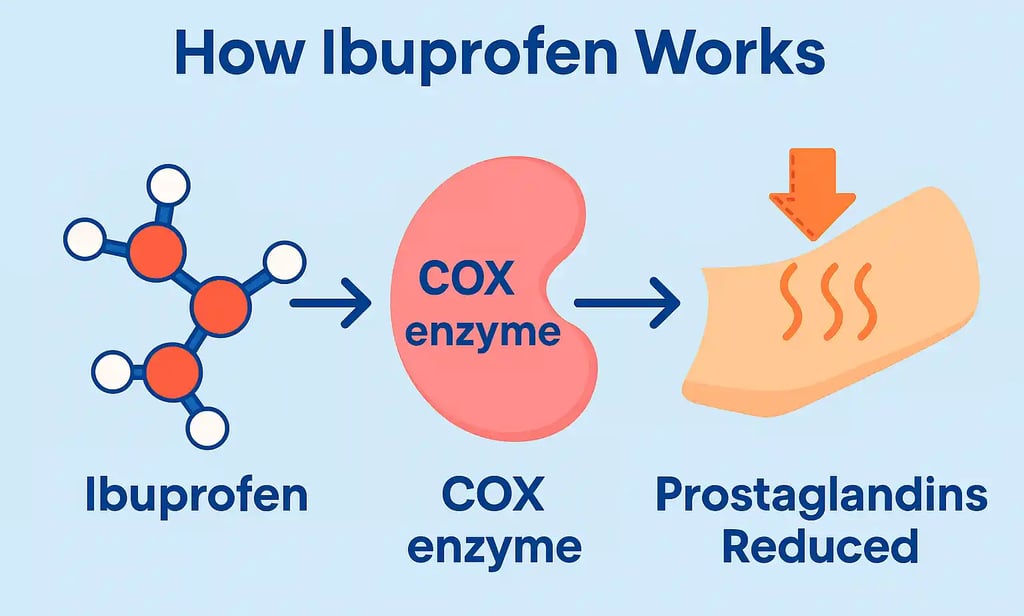How Does Ibuprofen Work?
How does ibuprofen work? Learn how this NSAID blocks prostaglandins to relieve pain, reduce inflammation, and lower fever effectively.


How Does Ibuprofen Work?
Ibuprofen is a nonsteroidal anti-inflammatory drug (NSAID) that works by reducing substances in the body that cause inflammation, pain, and fever. When you take ibuprofen, it doesn't just mask pain — it actually helps reduce the source of the discomfort by interfering with your body’s chemical signals.
This makes ibuprofen especially useful for treating pain from inflammation, such as sore muscles, arthritis, menstrual cramps, and minor injuries. It can also lower fever and ease general aches caused by illness.
How It Reduces Pain and Inflammation
Ibuprofen blocks enzymes in your body called COX-1 and COX-2 (cyclooxygenase enzymes). These enzymes help produce prostaglandins — hormone-like chemicals that promote inflammation, pain, and fever as part of the body’s healing process.
By blocking COX enzymes, ibuprofen lowers the number of prostaglandins produced. As a result, it reduces swelling, eases pain, and helps bring down fever — but it also comes with the potential for side effects, especially when used frequently or in high doses.
FAQ
What is an NSAID?
NSAID stands for nonsteroidal anti-inflammatory drug. These medications help reduce inflammation, fever, and pain. Ibuprofen, aspirin, and naproxen are common NSAIDs.
What are prostaglandins? Prostaglandins are chemicals made by your body in response to injury or illness. They trigger inflammation, fever, and pain — part of your body’s natural healing process. Ibuprofen helps block the production of these chemicals to reduce discomfort.
Does it affect the nervous system?
Not directly. Ibuprofen doesn’t dull the brain like opioids or sedatives. Instead, it works on the source of pain by reducing the inflammatory response, so fewer pain signals are sent to your brain.
Is ibuprofen a painkiller or anti-inflammatory?
It’s both. While it’s used to relieve pain, its strength lies in reducing the inflammation that causes the pain. That’s what makes it different from something like acetaminophen (Tylenol), which reduces pain and fever but doesn’t fight inflammation.
Why does it sometimes not work?
If the source of your pain isn’t related to inflammation — such as nerve pain or severe injury — ibuprofen might not be as effective. Also, taking too small a dose or taking it too late after symptoms start may reduce how well it works.
What to Keep in Mind Ibuprofen can start working within 20–30 minutes and typically reaches peak effectiveness within 1 to 2 hours. However, while it's effective at relieving symptoms, it doesn't treat the underlying cause of chronic conditions and may not be suitable for long-term use without medical guidance.
Disclaimer
This page summarizes information from trusted medical sources and is provided for general knowledge only. lt is not medical advice; Always consult your doctor or pharmacist for personal medical guidance (For a more comprehensive explanation please see the full disclaimer).
Resources
The information above has been gathered from several reputable sources, including the following:
[1] Mayo Clinic – Ibuprofen (Oral Route)
[2] MedlinePlus – Ibuprofen
[3] FDA – Ibuprofen Drug Safety Information


